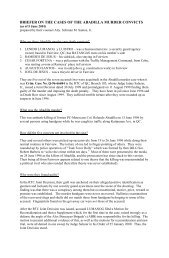Republic of the Philippines - Campaign
Republic of the Philippines - Campaign
Republic of the Philippines - Campaign
You also want an ePaper? Increase the reach of your titles
YUMPU automatically turns print PDFs into web optimized ePapers that Google loves.
APPELLANTS’ BRIEF<br />
People <strong>of</strong> <strong>the</strong> <strong>Philippines</strong> vs. Fortuna, et. al.<br />
S. C. G. R. No. 141660-64<br />
Ra<strong>the</strong>r than face squarely this human rights issue with <strong>the</strong> importance it deserves<br />
(Const., Art. II, Sec. 11: “The State values <strong>the</strong> dignity <strong>of</strong> every human person and<br />
guarantees full respect for human rights.”), <strong>the</strong> trial court takes <strong>the</strong> path <strong>of</strong> least resistance<br />
and passes <strong>the</strong> buck to <strong>the</strong> CHR or to <strong>the</strong> SC, even showing a cavalier attitude in <strong>the</strong><br />
process. The courts are supposed to be <strong>the</strong> last bulwark <strong>of</strong> constitutional and human<br />
rights but <strong>the</strong> trial court in <strong>the</strong> case at bar was not equal to this task. 18<br />
VII. THE TRIAL COURT ERRED WHEN IT LEFT ACCUSED<br />
LENIDO LUMANOG OUT IN THE DECISION'S RECOUNTING<br />
OF THE RESPECTIVE INDIVIDUAL DEFENSES OF THE SIX<br />
REMAINING ACCUSED, AND RULED THAT LUMANOG'S<br />
NOT TESTIFYING BEFORE THE COURT JUSTIFIES AN<br />
INFERENCE THAT HE IS NOT INNOCENT AND MAY BE<br />
REGARDED AS A QUASI-CONFESSION.<br />
The first indication <strong>of</strong> <strong>the</strong> trial court’s bias or unfairness against accused Lenido<br />
Lumanog in its appealed Joint Decision <strong>of</strong> July 30, 1999 (Annex A) is that he was left out<br />
in its presentation <strong>of</strong> <strong>the</strong> respective individual defenses <strong>of</strong> <strong>the</strong> accused (pp. 7-16). Only he<br />
(among <strong>the</strong> six remaining accused) was left out. Even his sidekick co-accused Rameses<br />
de Jesus was given <strong>the</strong> benefit <strong>of</strong> such a presentation (pp. 10-12). In fine, <strong>the</strong> defense he<br />
presented through counsel was effectively not heard by <strong>the</strong> trial court. This leaving out<br />
was a violation <strong>of</strong> his constitutional right to procedural due process (Constitution, Art. III,<br />
Sec. 1 and 14[1]) and particularly his right to be heard by counsel (Const., Art. III, Sec.<br />
14[2]; also International Covenant on Civil and Political Rights, Art. 14[3][d]); and<br />
Rules <strong>of</strong> Court, Rule 115, Sec. 1[c]).<br />
The “explanation” for that leaving out is found later in <strong>the</strong> appealed Joint<br />
Decision – a fur<strong>the</strong>r indication <strong>of</strong> <strong>the</strong> trial court’s bias or unfairness against accused<br />
18 Following Constitutional Commissioner Fr. Joaquin G. Bernas, S.J.’s statement during CONCOM<br />
deliberations on July 18, 1986 regarding <strong>the</strong> abolition <strong>of</strong> <strong>the</strong> death penalty, “I grant that <strong>the</strong> judges will<br />
have difficulty, but I suppose that <strong>the</strong> judges will be equal to <strong>the</strong>ir tasks,” as quoted in <strong>the</strong> death penalty<br />
case <strong>of</strong> People vs. Munoz (G.R. No. L-38969-70, February 9, 1989).<br />
Page 93 <strong>of</strong> 127<br />
93




